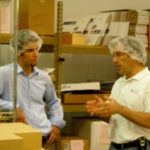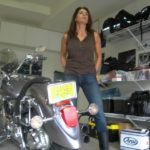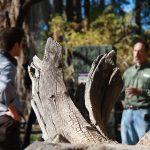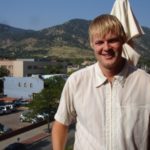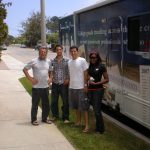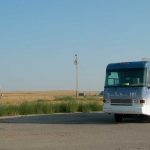Growing up, Chris always knew that he wanted to work in the news business, despite both of his parents being doctors. At a young age he dreamed of being a reporter on camera and before he graduated college he got his first taste of the business through an internship at NBC for the Today Show.
 He graduated from Syracuse University with a broadcast journalism degree and a minor in political science and without knowing any better, took a really bad job offer in Allentown, PA. The company’s focus was to produce medical reports and send them out to stations all over the country. His starting wage was $19,200, and the only reason why he remembers it is because he negotiated the extra $200. He learned a lot but was absolutely miserable in Allentown, a city with a population of 100,000 and nothing to do.
He graduated from Syracuse University with a broadcast journalism degree and a minor in political science and without knowing any better, took a really bad job offer in Allentown, PA. The company’s focus was to produce medical reports and send them out to stations all over the country. His starting wage was $19,200, and the only reason why he remembers it is because he negotiated the extra $200. He learned a lot but was absolutely miserable in Allentown, a city with a population of 100,000 and nothing to do.
After just over a year with the company Chris signed a new contract, offering him more money. Soon thereafter, someone whom Chris had interned for at the Today Show, called him. He told Chris that he was starting a production company in Los Angeles and offered him work under the condition that he was willing to work for free. Chris couldn’t resist the opportunity to get out of a job he didn’t like, in a town he couldn’t stand. He decided to break his contract and make the move West. One lawsuit and unaccepted settlement later, Chris found himself driving across the country to work for a production company, in a city of strangers, for nothing.
Chris Licht – Taking Risks and Making Mistakes
Chris considered it a good move in retrospect. He got out of a job that he was unhappy with and out of a city that was not suited for him. One thing we’ve found on the trip is that your job and the city you work in are two major determinants to whether people are happy with themselves. Most people would envy what Chris did. It all ties back into his philosophy of making your mistakes before you’re 30, and then worrying about a career.
He worked for two months for no pay with the company doing various production duties. He then got a job producing a news pilot show with KNBC in LA. After that, he fell into an opportunity to work on a daily show covering the O.J. Simpson trial, in which he even got to sit in the courtroom. His original dream of being an on-air reporter began to fade replaced by seeing what he could do with this production thing. He realized that he liked what he was doing even though it wasn’t his intentional direction.
He has been with NBC since then , working his way up the company the whole time. He opted to live and work in San Francisco for KNTV Channel 11 for two and a half years but is now is the senior producer for Scarborough Country airing on MSNBC.
Chris’s road is unique because if you want to get into the news industry, schools teach you to start in small to middle markets and bounce around until you land a job in either Los Angeles or New York. But Chris did the exact opposite by choosing to just move straight to L.A.. As a result of his hard work behind the scenes he was able to make some good contacts and move up the ladder as opportunities arose. On the other hand, if you are in a really small market then chances are you are not making the right contacts that will get you to the top. “You’re not going to get the right job by looking in the Times everyday, it’s all about utilizing your contacts and making those contacts.”
Something to also keep in mind for people looking for a job relates to a lesson Chris learned that college did not teach him. Chris says that the ability to get hired depends on the kind of person you are. This is always something to think about before you go into an interview. You have to picture yourself in their culture, and see if you can be a piece to their puzzle. Here was Chris’s input on the topic:
“The qualifications matter, but at the end of the day from the hiring end you have to ask yourself “Do I want to hang out with this person, do I want this person in my office every day?” You also should have energy and confidence. If I can throw any type of project at one of my interns and they can handle it with a good attitude and confidently, then I’ll throw something else at them. If they consistently display a good work ethic towards these projects, that’s when a job opens up.”
When asked about a typical work day, Chris said that he usually starts emailing his boss around 9 am, goes to work at 12, and produces the show at 9pm. He is there late at night, and his advice to anyone interested in getting into the industry is to get used to a minimum ten hour day and don’t expect to get paid extra for it.
“One thing that is common with students just coming out of school is that they want everything now. The problem is that they have not made mistakes yet and learned from those failures. The key to making mistakes is making them on a level that won’t kill your career. The danger with wanting everything now and getting everything now is that you are put in a high profile position where it will hurt you if you make a mistake. You grow and learn from making mistakes and they will happen.”
The above advice is something that has been frequently mentioned to us on the trip. Especially because I am planning on writing a book, even though I have no experience whatsoever with creative writing. I am told that it takes time to develop writing skills and if you produce a book that is successful then you are immediately put in an position where you are expected to write fantastic pieces, despite your writing skills having not been developed yet. The same is true of students going into any profession, you have to be patient. You can’t think that you can run the company better than the CEO because you have to learn from the mistakes that you haven’t made yet.
Some more advice that Chris had to give students was that:
“The biggest thing that is missing in my industry is people that know how to write. I don’t think it matters what career you’re in, but you have to know how to communicate through the way you write. If you are a good, fast, eloquent writer, it will open up a lot of doors.”
“Look and see what everyone is doing that have gone to where you want to go, and do something completely different. If you look at people that have made it, very few of them have stuck by the book. They’ve kind of gone on the path less traveled, and as long as you have that drive, that passion, you eventually will get to where you want to go.”
His favorite part about working at MSNBC was that:
“No two days are the same. I’ve worked at three Olympics (Sydney, Athens, and Salt Lake), and Athens is actually where I fell in love with my wife (just married this year). I’ve gone to Super Bowls (and) World Series because NBC has their hands in so many different things. I’ve got to start up a TV Station (and) build the newsroom. I also went into the locker room of the winner of the World Series.”
Interview
I kind of always knew I wanted to be in this business. I thought I wanted to be a reporter on camera. When I graduated I took a really shitty job in Allentown, Pennsylvania. It was right after graduation and it was for this company called MedStar Communications. They produce medical reports and send it to stations all over the country. I was making $19,200 a year. I remember because I negotiated the extra $200.
I got there and I was miserable. It was Allentown. There’s no one else around. It just sucked. One of the guys I interned for on the Today Show called me right after I signed a contract after my first year for a little bit more money. He said, “I’m starting a production company in LA. You should come out and work for me.’ He had no real job, no real nothing, but was like, ‘Come work for me for free.’
I just did it. I broke my contract. I got sued. My buddy and I got in my car and drove to LA. I worked for two months for no money while I was trying different things doing production stuff. I got a job producing a news pilot show. Then I got hired in the newsroom for the O.J. Simpson trial at KNBC. And it just kind of went from there.
What happened with the law suit?
Actually a good story. Like I said, they send out medical reports to stations all over the country. One of their clients was KNBC. They sued me for around $10,000. I went to my boss and said, ‘Just so you know, this company MedStar is suing me and they’re a client.’ He was like, ‘Are you kidding me?’ I had at one point told MedStar that I’d give them a $1,000 to settle it. They were like, ‘No.’
So my boss called them and was like, what the hell is going on with this? He told them to drop the lawsuit or he wouldn’t renew. This is the number #2 market in the country. I eventually gave them a $1,000 and they dropped it because of my boss.
What do you do right now?
I’m the executive producer of Scarborough Country. It’s a show of Joe Scarborough, a Congressman that’s on every night at 9 o’clock. It’s not really a political show, but it’s politics and pop culture.
I was at KNBC for awhile, and then I got moved up to San Francisco and stayed there for two and a half years. Then my wife is from here, so we moved here.
The first year was very eye opening. I always thought I wanted to be on air. So I thought I’d just do this because I didn’t have any real experience. The further I got down the road, I realized it was not what I wanted to do and where I wanted to be. The first year was really tough.
Los Angeles is a big difference from Allentown, Pennsylvania. And that’s some important advice. It’s not only about what you’re doing, but where you’re doing it. You can have a really good job in a really small horrible town, then that’s not what you’re going to like. It doesn’t matter how great the job is. Because when you’re done working, what are you going to do?
In my business, news, you usually go to small markets. What I tell people is that that’s not always the best way to do it. Because if you look in the text books, that’s what they say. You work your way up, and eventually you get there. But it’s something to be said that I’ve seen people go there behind the scenes in LA and make such great contacts. When you go to a small market, you get your on air experience. But then when you come back up, you have to know all these people.
That’s the key. Really small towns and really small markets don’t allow you to make top contacts. The people there are not at the top. That’s something they don’t tell you in school. It’s you picking your boss, not you picking the job.
The ability to get hired is a lot more dependent on what kind of person you are. When you look at hiring someone, you look at their qualifications. But at the end of the day, you ask yourself, ‘Do I want to hang out with this person? Do I want this person in my office?’
So your ability to relate to people, and be cool, and being someone that they wouldn’t mind getting a drink with is really important. That’s got to come across. If you’re a qualified dickhead, no one is going to hire you. You can be really qualified but your reputation is that you’re not a pleasant person, that’s much more important than I ever learned in school.
You’re just sort of building a show. Most people wind down at the end of their work day. Not me. You’re ramping up when it hits nine o’clock. From eight o’clock to ten o’clock you don’t talk to anyone because you’re so focused on the show.
Most people in this business work those nine to ten hour days and don’t expect to get paid extra for it. Minimum ten hour days.
What was difficult was taking your passion and actually making it happen. Because it’s a really competitive industry. You’ve got a hundred people in line behind you at all times. It was more like, I always had that passion for news to tell people what’s going on.
Both of parents were doctors. They kind of put up with it when I went to the local radio station to DJ.
What’s the key to success?
It’s being good. You can have all those things we talked about, but if you’re not good, in this business you’re going to fail. The key is making your mistakes where it’s not going to kill your career.
When you get out of school, you want everything now. You feel like you know more than people. Really in Los Angeles, I was allowed to go further than most people because I was a cool guy. The danger of that is making mistakes in a high profile job. When you make your mistakes, you want to be in a place where it won’t totally torpedo your career. I think that’s the key to success. Because you will make mistakes.
But it’s relative. When I was at KNBC, it was the #1 station in the #2 market in the country. I was 23 years old on the mid day show. So if I made a mistake, it’s not that big of a deal. Here at MSNBC, if I make a mistake, it will be on the Today Show. It’s all relative.
So be wary of wanting it all at once. There’s making high profile mistakes, and you might burn out too fast.
My biggest failure was a really famous clip. Did you ever Bowling for Columbine? There’s a really famous clip where there’s a pursuit in Los Angeles. At the end of the pursuit there’s a big standoff. This guy takes a shotgun and blows his head off live on TV. And I was producing at KNBC that day in the control room when that happened.
I was kind of like, ‘Oh wow that guy has a shotgun. Oh wow he stuck it in his mouth.’ I was watching it instead of editing. So of course, that was huge. Instead of pulling out or going to black, that was the worst day of my career.
Overcoming it was largely due to bosses that didn’t sell me out. They could have very easily gotten me fired. But they protected me from the onslaught. So it was learning from live TV and deciding what to do next time. What I did was I went to them and said, ‘Alright. I fucked up. Here’s what I would have done differently for next time.’
That was the biggest mistake I’ve made. Pretty big one. Millions of people saw it and it’s in a movie.
The biggest thing that is missing in my industry is people that know how to write. It doesn’t matter what career you’re in, but if you’re a fast elegant writer, it will open up doors for you.
The other piece of advice that I give is to look and see what everyone else is doing to get to where you want to go, look at what people have done before you, and do something completely different. If you look people who have ‘made it’ in my business, very very few of them did this and this and this. They have all gone in their own direction.
You just take a path less traveled with skills and drive and passion you’ll eventually get to where you want to go.
Going to Los Angeles was probably the dumbest thing to do. You don’t go to the biggest market and expect a job. But I lucked out. I showed up in LA and things happened. But there are opportunities out there.
The other thing I would say that until you’re 30, there’s no such thing as ‘taking chances.’ There’s no such thing. You can make mistakes and do things career wise that don’t make sense and it doesn’t matter. Because you’re still learning.
You have to be passionate about it. People underestimate that. You gotta love what you’re doing. It doesn’t matter how much money you’ll make. I think the money will come, if it’s something you’re passionate about it. So take chances.
If you do a flow chart of my career, I can trace it to my junior year of high school. My mom was asking me about my career. I went with her and met this woman who worked at the local radio station and she got me an internship. There, I met a guy who worked for NBC. He got me the Today Show internship. The guy who hired me in LA came from the Today Show. It’s all about connections. No one really makes it by looking at jobs in the New York Times.
It’s about picking your boss. My boss right now has a lot of contacts. The other thing is doing your job. If you’re trying to work and get to your next job, it will never work. It’s much more effective if your boss realizes that you’re a good worker instead of you saying that you’re a really good worker. It’s like, hard work.
I worked hard at KNBC. Someone called in sick, I’d work the extra shift. Holidays? I’d work those too. You just get a reputation like that, although it cuts in on your social life.
What’s the best part about working at MSNBC?
No two days are the same. We get different stories every day and do new stories with different challenges and dynamics. It’s always changing. I’ve been to three Olympics. That’s where I fell in love with my wife was in Athens. I was sort of her boss.
I’ve gone to Super Bowls. World Series. I got to help start up a TV station and build a newsroom. If you go back there right now, it’s like, my vision of how operations are going to work. That’s kind of cool.
I went into the Angels locker room after they won the World Series. I thought to myself, ‘How many times do you get to go into a locker room of a team that just won Game 7 of a World Series?’ It was pretty cool.
The Olympics was really hard work. 18 hour days for 25 days in a row. I’ve done Sydney, Athens, and Salt Lake.
If you look at this company, anyone who’s anyone has somehow had some kind of affiliation with the Olympics. Much more so than me. But a lot of the best and brightest people have gotten their starts in the Olympics.
What qualities have you seen in new hires?
Energy and confidence. If you have the right job, the right boss, the right company, and the right city, you’ll be good.
The first five jobs you have should be learning. I was that intern that would be friends with the producers. Hey Chris, you want to fly out to LA and interview people in the streets?

